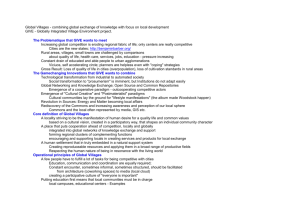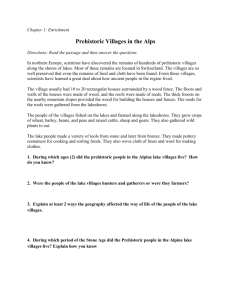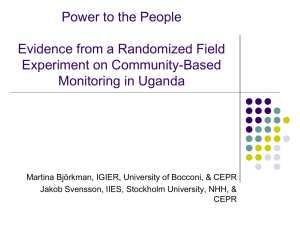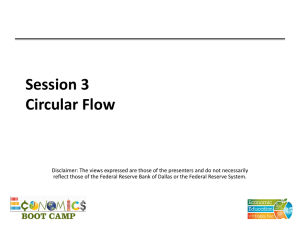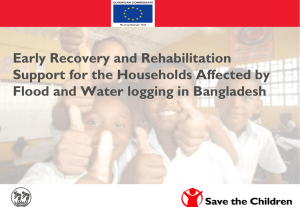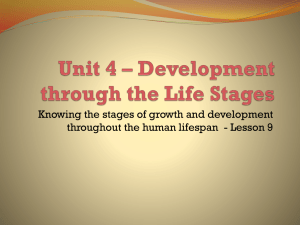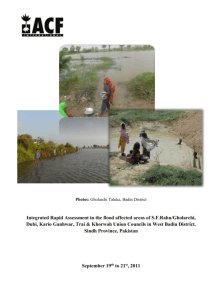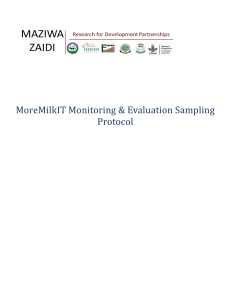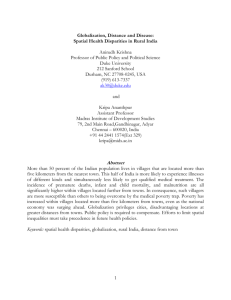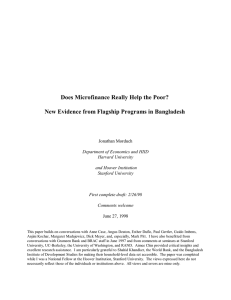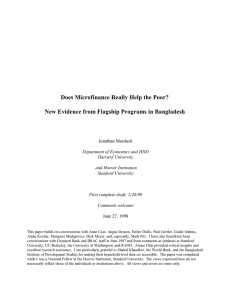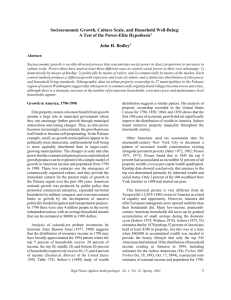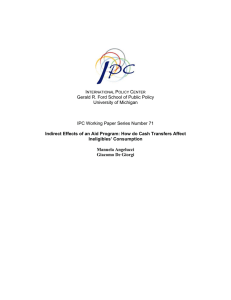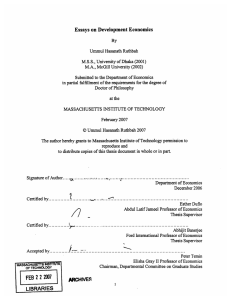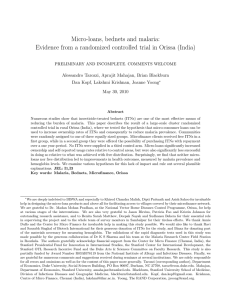Report_Komen
advertisement
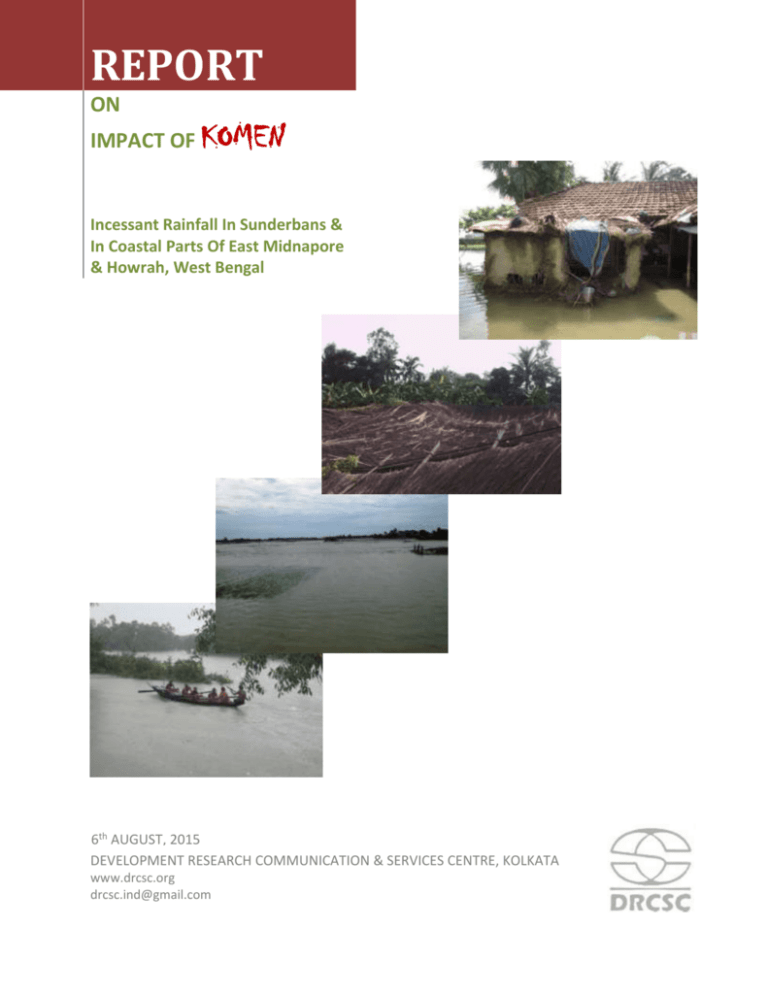
REPORT ON IMPACT OF KOMEN Incessant Rainfall In Sunderbans & In Coastal Parts Of East Midnapore & Howrah, West Bengal 6th AUGUST, 2015 DEVELOPMENT RESEARCH COMMUNICATION & SERVICES CENTRE, KOLKATA www.drcsc.org drcsc.ind@gmail.com The depression created from cyclone Komen, which has been hovering over Bangladesh, has triggered heavy rain in India’s northeastern and eastern states. In West Bengal, more than 1.8 million people in 5,600 villages across 12 districts were affected by rains and flooding. The condition in Sunderbans & other coastal parts are even more alarming. Poor drainage systems & weak river embankments exposes the inhabitants of coastal areas into more vulnerable condition. In maximum of the intervening villages of DRCSC in Sunderbans, Howrah, East Midnapore Districts the farmers failed to grow seed beds. All the seedlings got damaged due to water stagnation. Livestock diseases are increasing. The crisis of fodder is becoming acute. The situation will get even more adverse if such weather continues. Below is a fact sheet depicting the present scenario of intervening villages of Sunderbans & other 2 Districts of West Bengal District Block Gram Panchayat Villages No of Groups No of Affected HHs Sandelerbill, N 24 Pgs Hingalganj, Hingalganj, Kalitala Sandeshkhali Bermajur I, Bermajur 20 76 1072 30 114 1326 7 10 147 10 26 364 II, Hatgachi G-Plot, Brajaballavpur, Ramganga S 24 Pgs Patharpratima, Jyotishpur, Basanti Mashjidbati, Uttarmokamberia, Bharatgarh, Basanti East Midnapore Brajalalchalk VII, Chandipur Dibakarpur IX, Kulbari VIII Howrah Bagnan I 4 Districts 6 Blocks Bangalpur, Haturia II, Bagnan II 20 GPs 67 villages 226 Groups 2909 HHs 1 Brief highlighted facts: The households suffered loss in agriculture. The farmers failed to grow seedlings. 9095% of the agriculture fields are submerges under water. Since paddy is the main crop of the affected regions therefore all 2909 families will be suffering from acute food crisis in near future. Crops sown in the homestead land also got damage. Farmers having betel vines are presently submerge. Fishery is one of the main earning sources of people residing at Sunderbans. Since all the ponds are over flowed farmers suffered loss in fishery. According to the report ~ 1498 farmers have incurred loss from fishery. Livestock death occurred in many areas. The animal diseases are also increasing alarmingly due to lack of shelter & fodder. The death ratio is much higher in village Perghumti of Kalitala GP in Hingalganj Block comparative to other villages. 504 livestock (includes hens, ducks, goats & cows) death reported so far in 448 households at Perghumti. Due to water stagnation ~70 HHs are shifted in rehabilitation camp at Phoolbari villages of Chandipur Block. Stagnant water, improper sanitation systems are causing water borne diseases both to human & cattle. There are 23 Adibasi families residing beside Mridangabhanga river of Indraprastha village of Patharpratima Block who usually earn their livelihood by collecting fish lings, crabs, honey & fuel wood from nearby forest. But due increase in water level they are presently unable to access those forest resources. Out of the 2909 affected households 984 households are severely affected. They suffered loss in agriculture sector, homestead garden, fishery, and livestock. Out of these 984 households there are ~20 households who lost their shelter. Partially damaged houses no are ~200. In two villages (Polpara & Simulati) of Sandeshkhali I & II Blocks villagers are facing drinking water crisis. The tube wells are not functioning properly due water stagnation. 2 Households having toilets are also under water in those villages. 110 HHs are facing these problems. To cope with the situation: Short term responses Health & hygiene: (Within 45 days) Support of dry food, Support of tarpaulin, ORS, Zioline, lime, mosquito nets, mosquito repellants Organizing awareness on basic health & hygiene and training on herbal medicine Introducing portable chullah for the households Agriculture sector: Single stick paddy cultivation in comparatively upper land where the water level is decreasing Preparing raised platform to grow seed bed for short duration paddy cultivation Use of compost ball to grow vegetable saplings (Chilly, Eggplant etc) For homestead garden support can be provided to grow leafy vegetables (amaranths) Use of unused container, sacks to grow saplings Preparing floating structure to grow vegetables Some climber crops can be reintroduce in the affected areas Preparing hanging structures (by bottle, earthen pots etc) to grow vegetables Allied Agriculture: Repairing the shelter house of cattle Raising the shelter house of small farm animals & birds Organizing vaccination & animal health camp in collaboration with BLDO Support of fodder (Nepiar, Gama, Para, Dinanath etc) Support of fislings & fish feeds. 3 Support of fishing nets Long term responses Support of seeds in Rabi season (After 45 days) Support for trellises Support of seeds for cultivating sesame, moong Support for Multipurpose trees Support of birds & small farm animals Linking Local Govt for improvement of drainage system, road communication Sketch of some cultivation techniques that are planned: Immediate/short term/temporary responses 4 Immediate mid-term/ semi-permanent responses Long term response after saline water recedes 5 Photographs of the affected areas: 6
